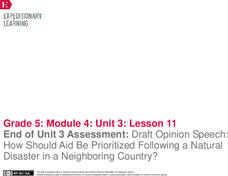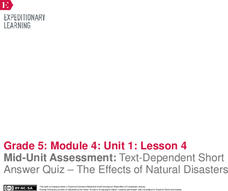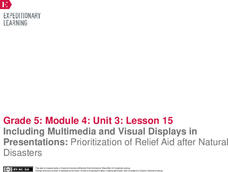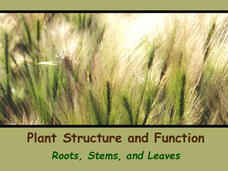EngageNY
Building Background Knowledge and Making Inferences: What Is a Natural Disaster?
That's a disaster! Scholars complete a gallery walk to view images and make inferences about natural disasters. They fill out a note catcher about what they observe and infer any questions they may have. They then participate in a World...
EngageNY
End of Unit Assessment, Part 1: On-Demand Essay “What Makes A Hurricane A Natural Disaster?”
It's time to refine writing and word choice. Learners work on Part 1 of their end of unit assessment by creating an essay titled What Makes a Hurricane a Natural Disaster? They use glossaries and graphic organizers from previous...
Walt Disney Company
Disaster Preparedness Activity Book
Join the American Red Cross as well as Mickey and friends as they help to prepare young scholars for natural disasters. After reading brief informational passages about earthquakes, floods, fires, storms, tornadoes, and hurricanes,...
EngageNY
End of Unit 3 Assessment: Draft Opinion Speech: How Should Aid Be Prioritized Following a Natural Disaster in a Neighboring Country?
Put it to the test. With the cumulative resource, pupils complete the End of Unit 3 Assessment. Using everything they've learned in the unit, they write a draft of an opinion speech about how to prioritize aid after a natural...
EngageNY
Mid-Unit Assessment: Text-Dependent Short-Answer Quiz—The Effects of Natural Disasters
Readers complete a mid-unit assessment by reading the text How Do Hurricanes Form? They answer text-dependent questions about hurricanes with short answer and sequencing. Learners then participate in a read aloud and text chunking...
Port Jefferson School District
Hurricane Katrina
Young scientists track Hurricane Katrina across the Atlantic Ocean as they learn about these destructive forces of nature. Provided with a table of data tracking the location and conditions of Katrina over a one week span, students...
EngageNY
Including Multimedia and Visual Displays in Presentations: Prioritization of Relief Aid after Natural Disasters
It's time to put the plan into practice. Using their plans from the previous instructional activity, scholars create multimedia and visual displays for their opinion speeches. Next, they watch videos of speeches and use a presentation...
Ready Houston
Make a Plan. Build a Kit. Stay Informed.
Help prepare your youngsters for an emergency or natural disaster by discussing important topics as where to meet, how to remain in contact, and what belongs in an emergency kit.
Radford University
Natural Disaster Recovery and Quadrilaterals: Trapezoids and Land Assessments
After a tornado, an insurance company is in need of finding the area of a plot of land. Pupils use their knowledge of trapezoids and area formulas to calculate the area of the plot of land. The scholars work in groups to justify the...
EngageNY
Researching about the Red Cross: What Is a Multinational Aid Organization?
Lend a helping hand. Pupils read two informational articles about international aid organizations and how they help areas affected by natural disasters. Scholars attempt to uncover the gist of each text, discussing their thoughts in...
EngageNY
Mid-Unit 3 Assessment, Part I: Short Constructed Response and Organizing Notes for a Public Speech
It's time to put pen to paper. Scholars complete the first part of the mid-unit 3 assessment, writing a short constructed response about international aid following a natural disaster. Next, pupils use informational texts and note...
NNF
Floods Happen
Did you know that flooding is the most common natural disaster in the United States? Prepare your learners with the facts about floods and offer them the proper knowledge and tools for dealing with this type of emergency.
Science Matters
Ring of Fire
Over a period of 35 years, earthquakes and volcanoes combined only accounted for 1.5 percent of the deaths from natural disasters in the United States. The 15th lesson in a 20-part series connects the locations of earthquakes and...
Curated OER
Hazards: Second Grade Lesson Plans and Activities
Equip learners with safety knowledge in the case of an earthquake. After coloring the places to go to get help after a quake, and label places that wouldn't be safe to go after a quake, young geologists simulate three levels of...
Kenan Fellows
Making Connections with Water Quality
What's in your water? And, why is water quality so important? Enhance your class's level of water appreciation through a lesson that demonstrates the necessity of water quality. Environmental enthusiasts explore the EPA's Clean Water...
DiscoverE
Reach for the Skies
Scholars view the film Reach for the Skies to learn about the Shangai Tower. Following a discussion and observation of premade shapes, pairs design and construct a tower using uncooked pasta, straws, newspaper, tape, and marshmallows....
Federal Reserve Bank
Lesson 4: Back to School
Based on your current level of human capital, how long would it take you to earn $1,000,000? What about your potential human capital? Learners explore the importance of education and experience when entering the workforce, and compare...
Realistic Preparedness
First Aid Kit
Here is the perfect resource to support learners in designing comprehensive first aid kits tailored to their unique location, budget, and needs. This is an excellent supplement to your instruction on emergency preparedness!
Reed Novel Studies
We All Fall Down: Novel Study
Where were you when the world stopped turning that September day? Will, a ninth grade student in We All Fall Down, was at work with his father in the World Trade Center. Scholars read Will's story of the accounts told in first...
Biology Junction
Plant Structure and Function: Roots, Stems, and Leaves
Scientists found fossils of plants more than 420 million years old—but plants existed for up to 100 million years prior to these fossils. Learn about the importance of plants to the entire planet. Viewing a presentation helps scholars...
Humanities Texas
A President's Vision: Franklin D. Roosevelt
This poster goes well beyond any traditional worksheet in allowing learners to analyze a variety of primary source documents related to the presidency of Franklin D. Roosevelt.
Out-of-School Time Resource Center
Nutrition and Physical Activity
Emerging nutritionists explore what it means to be healthy. In the beginning of the unit, your class will examine the five food groups and learn how food gets from the farm to our plates. This leads into the investigation of...
Orange County Water Atlas
Location, Location, Location…
Young geographers discover not only how to read and recognize coordinates on a map, but also gain a deeper understanding of latitude and longitude and how climate changes can vary significantly across latitudes.
EngageNY
Final Performance Task: Delivering an Opinion Speech with Multimedia Display
Welcome to the grand finale! Scholars practice reading their speeches to a partner and make last-minute changes based on feedback. Pupils then present their final opinion speeches to their small groups and show off their work in a...
Other popular searches
- Esl Natural Disasters
- Natural Disasters Worksheets
- Natural Disasters Reading
- Types of Natural Disasters
- Art Natural Disasters
- Science Natural Disasters
- Teaching Natural Disasters
- Math Natural Disasters
- Geography Natural Disasters
- Natural Disasters Poster
- Natural Disasters History
- Natural Disasters Data























